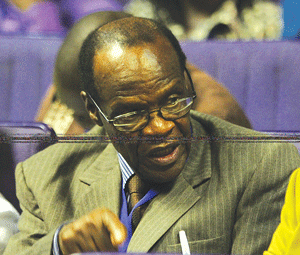
THE Constitution guarantees every Zimbabwean citizen the right to vote.
But in Matabeleland, thousands of people are not even regarded as citizens.
BY NOKUTHABA DLAMINI
According to Zimbabwe Electoral Commission (ZEC) figures, the Matabeleland region has the least number of registered voters.
The reasons are not too difficult to find. What is unfathomable for many residents is why the government is not doing anything about it and seems intent on treating them like foreigners with no stake in key processes such as voting.
Born in Sikabela village near Victoria Falls 42 years ago, Bongani Ngulube unswervingly identifies with Zimbabwe even though he is constantly made to feel like a stranger in the only country he has called home.
Section 67 of the Constitution states that every Zimbabwean has the right to vote and Ngulube wants to exercise that right in the elections scheduled for no later than August this year.
But he will be unable to.
- Chamisa under fire over US$120K donation
- Mavhunga puts DeMbare into Chibuku quarterfinals
- Pension funds bet on Cabora Bassa oilfields
- Councils defy govt fire tender directive
Keep Reading
Like thousands others in Matabeleland, efforts at getting a national identity document [ID] have been a nightmare.
“We were told to go back to where we came from,” Ngulube said while narrating the ill-treatment he repeatedly endures at the hands of officials from the Registrar-General (RG)’s Office each time he has tried to obtain an ID.
His hopes of voting in the upcoming election have vanished.
After registering 5 310 734 potential voters in the just-ended mobile voter registration programme, ZEC has described the figures as “excellent”.
“The number that we got is an excellent number,” said ZEC commissioner Qhubani Moyo after the elections management body ended the mobile voter registration exercise in February.
“It represents an overwhelming turnout,” he said.
Except, of course, in Matabeleland.
Only 239 367 people registered in Matabeleland South, the province with the least number of registered voters.
Bulawayo has 243 146 registered voters, while 319 549 people registered in Matabeleland North province. According to the 2012 census, Bulawayo Metropolitan had 653 337 adults. Matabeleland North had 749 017 adults while Matabeleland South has 683 999.
The government-sponsored Gukurahundi killings in Matabeleland in the 1980s and the nationwide slum clearing programme code-named Operation Murambatsvina in 2005 have left many people in this region undocumented.
Excluded from national processes such as voting, they feel like strangers at home.
Civil society organisations say although the reasons for the poor voter registration turnout in Matabeleland are “many”, the lack of IDs ranks high.
Thousands of people who lost their parents during the Gukurahundi atrocities soon after independence have been struggling to obtain IDs, forcing them out of school as well as leading to their exclusion from important national events such as elections. People affected by Operation Murambatsvina, which displaced over 700 000 countrywide according to the United Nations, are in the same predicament. Loveness Nyoni, a community worker in Victoria Falls, said she tried helping 299 people from Chikandakubi village in the Jambezi area to obtain IDs without success. She said most of the people aged 35 years and above are victims of either Gukurahundi or Operation Murambatsvina.
“You could not take anything out and that’s when we lost all our documents. Our children have been affected too,” said Nyoni.
Freedom First Project director Dumisani Mpofu said lack of documentation was behind the voter apathy in Matabeleland. “There is the Gukurahundi factor where we still have many people who cannot be registered because of lack of IDs,” said Mpofu.
“Matabeleland also has a lot of undocumented people because there is just no incentive to get documented.
“Without prospects of employment, why will someone bother to have an ID?” he queried, adding that the process of obtaining an ID was too complicated and unaffordable for many poor people in the region.
“This apathy also tells us something about the Registrar General’s Office.
“This is an arrogant department which harasses people, with those from Matabeleland being the most affected,” Mpofu claimed. “At times a village head’s letter works for you to be documented, but at other times it doesn’t work.
“At times anyone older than you can be your witness, but at other times it has to be close relatives.
“It is just a department that is too arrogant to handle issues of civil documentation,” said Mpofu, whose organisation has tried to help some residents obtain IDs.
A recent survey by Matabeleland- based civic groups showed that 46% of children in Matabeleland South and North provinces did not have birth certificates.
The survey revealed that 42% of the parents did not have the correct documentation and 14% could not afford the costs of getting IDs.
About 12% blamed their lack of documents on the “unhelpful RG department staff”.
At least 4% of those whose views were sought during the survey said “the process is time-consuming, took too long and applicants gave up”.
An RG department official based in Lupane said hundreds of people seeking IDs are turned away every week at various centres in the province because of the rigid system.
“We are not happy because we turn elderly people away,” the official, who could not be named, said.
“In Lupane, we issue IDs on Monday and Tuesday.
People come in their hundreds and it pains us to turn them away because most of them are Gukurahundi victims.
“We issue out a maximum of 80 IDs per week, but in other provinces like Bulawayo they issue 100 per day,” added the official.
Home Affairs minister Obert Mpofu said he was unaware of the problem.
“I am not aware of the reduction in numbers, those officers are out there to issue national documents and there should be no reduction when people are available and in urgent need.
It is against government policy,” he said.
Last month, President Emmerson Mnangagwa said Zimbabweans must brace for elections within the next five months.










